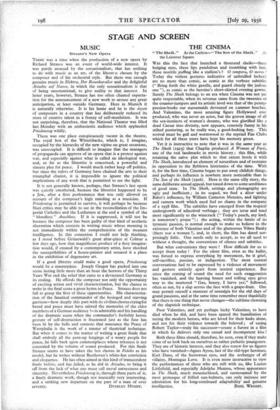MUSIC STAGE AND SCREEN
Strauss's New Opera THERE was a time when the production of a new opera by Richard Strauss was an event of world-wide interest. It was partly aroused by the sensationalism, that has nothing to do with music as an art, of the librettos chosen by the composer and of his orchestral style. But there was enough genuine music in Elektra, Der Rosenkavalier and the delightful Ariadne auf Naxos, in which the only sensationalism is that of being unsensational, to give reality to that interest. In latter years, however, Strauss has too often cheated expecta- tion for the announcement of a new work to arouse any great anticipation, at least outside Germany. Here in Munich it is naturally otherwise. It is his home and he is the doyen of composers in a country that has deliberately reduced its store of creative talent in a frenzy of self-mutilation. It was not surprising, therefore, that the National Theater was filled last Monday with an enthusiastic audience which applauded Friedenstag wildly.
There was one place conspicuously vacant in the theatre. The royal box of the Wittelsbachs, which is, I imagine, 'occupied by the hkrarchs of the new regime on great occasions, was unoccupied. It is difficult to imagine that the managers of propaganda can approve of an opera that is a protest against war, and especially against what is called an ideological war, and, so far as the librettist is concerned, a powerful and sincere plea for peace. I would much rather keep off politics, but since the rulers of Germany have chained the arts to their triumphal chariot, it is impossible to ignore the political implications of any work that is permitted to see the light.
It is not generally known, perhaps, that Strauss's last opera was quietly smothered, because the librettist happened to be a Jew, after a first performance that was only allowed on account of the composer's high standing as a musician. If Friedenstag is permitted to survive, it will perhaps be because Nazi critics may be able to see in the reconciliation of the Im- perial Catholics and the Lutherans at the end a symbol of the " bloodless " Anschluss. If it is suppressed; it will not be because the composer has been guilty of that kind of aesthetic aberration which consists in writing music whose meaning is not immediately within the comprehension of the meanest intelligence. In this connexion I could not help thinking, as I stood before Griinewald's great altar-piece at Colmar a few days ago, how that magnificent product of a fiery imagina- tion would, if created by a contemporary artist, have shocked the susceptibilities of a house-painter and secured it a place in the exhibition of degenerate art.
If a good libretto could make a good opera, Friederutdg would be a masterpiece. Joseph Gregor has packed into one scene lasting little more than an hour the horrors of the Thirty Years War and the relief that came to a devastated Germany at its ending. He affords the composer not only the opportunity of exciting action and vivid characterisation, but the chance to write in the final scene a great hymn to Peace. Strauss does not fail to grasp the first of these opportunities. His characterisa- tion of the fanatical commander of the besieged and starving garrison—how deeply this part with its civilian chorus crying for bread and peace must have stirred the memories of the elder members of a German audience I—is admirable and his handling of the dramatic scene when the commander's foolishly heroic gesture of self-destruction is frustrated just as the fuse has been lit by the bells and cannons that announce the Peace of Westphalia is the work of a master of theatrical technique. But when it comes to the matter of writing a great finale that shall embody all the pent-up longings of a weary people for peace, he falls back upon commonplaces whose triteness is not concealed by the volume of sound produced. For this finale Strauss seems to have taken the last chorus in Fidelio as his model, but he writes without Beethoven's white-hot conviction and eloquence. He has often aimed at this kind of transcendent finale before, and has failed, as he did in Ariadne, to bring it off from the lack of what one must call moral earnestness and sincerity. Nevertheless Friedenstag is, through three parts, of it, a finely dramatic work, though not musically very interesting, and a striking new departure on the part of a- man of over


































 Previous page
Previous page